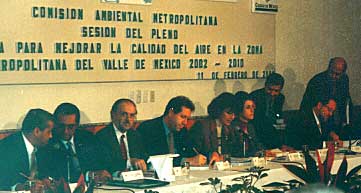 |
||
| Massachusetts Institute of Technology |
|
Integrated Program on Molina Center for Energy and the Environment Voice: (858) 657 Fax: (858) 657- E-mail: info@mce2.org |
Metropolitan Environmental Commission (CAM) unveils new air quality programOn February 11, 2002, the Metropolitan Environmental Commission (Comisión Ambiental Metropolitana, or CAM) announced PROAIRE III, a $12 billion program aimed at improving the air quality of the Mexico City Metropolitan Area (MCMA) over the next eight years. Dr. Adolfo Mejia, Technical Secretary of the Metropolitan Environmental Commission, made the announcement in a public meeting attended by Lic. Victor Lichtinger, Federal Environment Minister; Lic. Martha Hilda Gonzales, Secretary of Ecology of the State of Mexico; Dr. Claudia Sheinbaum, Secretary of the Environment of the Federal District; Dr. Carlos Santos Burgoa, Director General for Environmental Health of the Federal Health Ministry; and Drs. Mario and Luisa Molina, who led a multidisciplinary collaborative study that served as the scientific foundation for this program.
The Program to Improve Air Quality in the Valley of Mexico 2002-2010 (PROAIRE III) includes more than 80 measures that affect transportation, industry, the service sector, natural resources, health, and education. It focuses on the reduction of ozone and particulate matter, and emphasizes environmental education and citizen participation. At the public meeting that took place in a hotel in Tlalnepantla, Dr. Carlos Santos-Burgoa remarked that they [officials] would be satisfied when they are able to reduce the ozone level to below 100 IMECA and control the fine particulates. Dr. Claudia Sheinbaum stressed that the implementation of the measures described in the Program depends on the political will of the participating institutions and the coordination of the institutions involved. Lic. Martha Hilda Gonzales added that society should get involved and contribute individual solutions to pollution reduction. Lic. Lichtinger mentioned that one of the pending issues is the restructure of CAM, which should be independent from political influence and with a permanent Technical Secretariat. Dr. Mario Molina said that although the Program was based on solid scientific knowledge, economic and political factors would be critical for its successful implementation. He concluded, "Our hope is that the Program will help improve the quality of life of the inhabitants of the Valley of Mexico." |

